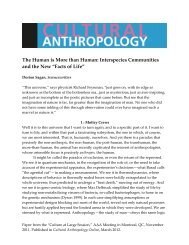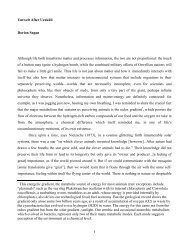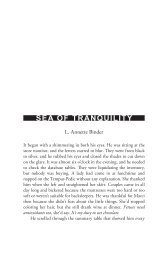PESTICIDES IN COCA-COLA AND PEPSI - Cultural Anthropology
PESTICIDES IN COCA-COLA AND PEPSI - Cultural Anthropology
PESTICIDES IN COCA-COLA AND PEPSI - Cultural Anthropology
Create successful ePaper yourself
Turn your PDF publications into a flip-book with our unique Google optimized e-Paper software.
CULTURAL ANTHROPOLOGY 22:4<br />
672<br />
of The Coca-Cola Company and PepsiCo in a joint press conference. The Coca-<br />
Cola Company CEO added that “the allegation is serious and it has the potential to<br />
tarnish the image of our brands in the country. If this continues we will consider<br />
legal recourse” (Economic Times 2003a). The offensive continued in several full-page<br />
advertisements taken out, including one by The Coca-Cola Company that declared,<br />
even as the government investigations were pending, that “the most valuable brand<br />
in the world makes no compromises on the quality of beverages it serves Indian<br />
consumers” (Telegraph 2003). Soon afterward, there was a shift in the strategy when<br />
The Coca-Cola Company and PepsiCo quietly decided to drop their libel suit against<br />
CSE, an action the CEO of PepsiCo justified as a step to reduce the risk of harm to<br />
their brand equity. “Taking CSE to court won’t improve our brand image” (Business<br />
Line 2003a).<br />
The trajectory of the response to CSE’s findings indicate MNC efforts aimed<br />
at damage control, especially after the initial reaction, which was widely described<br />
as arrogant, dismissive, and self-injurious even by the staunchly corporate-friendly<br />
business press. Probusiness newspapers felt compelled to offer advice that they<br />
considered to be sensible, for once shedding their cynicism. Despite the reluctance<br />
to engage in what they called “MNC-bashing,” the business and financial media<br />
blamed MNC response for their woes. “Sensitive brands are built by sensitive people<br />
. . . sensitive brands make for themselves a future that is pretty much insulated<br />
from the vagaries of the market at large” (Business Line 2003b). Comments such as<br />
“it is a pity that the Cola giants have failed to see the basic point about building<br />
trust and relationship with their customers” (Bhattacharya 2003), had the tone of<br />
disappointment writ large over them and sought to drill in what was perceived<br />
as the missing common sense in the action of The Coca-Cola Company and PepsiCo.<br />
This is “not consumer raj,” (Business Standard 2003d) was uttered as a damning<br />
indictment of state-bureaucratic failure, in a manner reminiscent of the utopian<br />
idealism that the media often accused votaries of leftist politics of espousing. Ultimately,<br />
however, there was broad agreement that the solution to the pesticide<br />
problem lies in wholeheartedly embracing neoliberalism regimes of discipline, and<br />
in swearing allegiance to the primacy of brand image as the new currency. Despite<br />
the recognition that the markets may not work well without the requisite regulatory<br />
safeguards, all-round self-interested behavior could provide the solution: “In<br />
the long run we need stronger accountability from both NGOs and corporations.<br />
Till then, let society levy penalties through loss of reputation, on NGOs as well<br />
as corporations. CSE depends on brand value no less than Pepsi” (Economic Times<br />
2003b).






